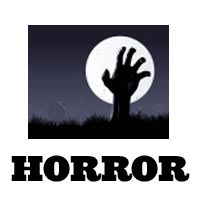 |
| Source |
Recently my brother and sister and I were having a conversation and my brother said something that made me smile, but really had a lot of truth in it. You see, my brother is nineteen and he's at a point in his life where he's really struggling to find himself. My sister made some comment about not flirting with the darkness. To which my brother hesitated, then replied, "But I kind of like to flirt with the darkness."
That statement probably should have alarmed me, but instead it made me smile. I just saw a lot of myself in him, a lot of how my family is (I come from a very long line of rebellious) and a lot of humanity as a whole. Don't we all like to flirt with the darkness to some extent?
Now, I've never been one to do this in deed (just too nerdy and boring, I guess) but in terms of stories? Oh yeah. I love horror films, mysteries, true crime, psychological thrillers. I love them less for the scares and more for the sheer humanity of it all. The stark, uncompromising good vs. evil.
- Horror is less a genre, and more a technique, or so Mr. Collins asserts. It's a way of making your readers feel fear, loss, terror, but also adrenaline. A flirting with the darkness that makes you feel alive.
- Tragedy. While generally not considered synonymous with horror, they actually go hand in hand. After all, what could be more horrible than suffering an immense tragedy? "Tragedy" is Greek for "a horror story." So loss--extreme loss such as death and tons of it--is inherently part of the horror genre. It's just handled differently than classical tragedy is.
- You get to bring God, religion, spirituality, etc. into the story and deal with it. It's almost expected that such issues will be present in horror, and it works for this genre.
 |
| Source |
The Evolution of Horror (in films, though books run a close parallel):
- 1930s-1950s -- The Wolf Man, Bela Lugosi's Dracula, Tales of Terror. These films were very over-the-top horror. While people were scared by them, no one saw them as particularly realistic.
- 1960s -- The sexual revolution came about, and more sexual content was seen in films. The '60s also saw the advent of the movie ratings system, which changed the way films were approached.
- 1970s-80s -- We still saw morality plays in horror films, but negative content (sex, gore, swear words) pushed forward, making more and more appearances, particularly in horror films.
- 1990s-00s -- The advent of gratuitous torture porn. This is total graphic realism without any redemptive qualities.
 |
| Source |
All that's left is to venture into the all-too-real or "found footage" films (i.e. Paranormal Activity, The Blair Witch Project), the not understood or scientifically explained (i.e. hauntings, possessions), the psychological (the Saw films, Alfred Hitchcock) and other things that genuinely scare, rather than just being about the content. This, by definition, appeals to the vulnerable, human side of the audience.
So, what's the point? How does all of this lead to the morality of horror?
The horror deals with very human things, but in the extreme. It's not just death, it's a serial killer on a spree. It's not just defending what's yours, it's kill or be killed. It's very flawed characters being thrown into the most extreme, visceral situations you can imagine, and then forced to try and find religion (or the lack of it) in those situations, or coming out of them.
Because of this, horror deals with morality in a more obvious, in-your-face way than any other genre. It forces the audience to think about and face issues of this sort in a more visceral way than most people are use to.
There are many people who don't enjoy the horror genre. They usually site reasons such as not liking to be afraid, not liking the gratuitous content, etc. But perhaps it's more than that. Maybe on some level they don't like being confronted with such stark, uncompromising situations as what the horror genre shows them. It's hard to face such things when we, as human beings, don't have the option to cope by cutting them down into more manageable pieces, or hiding behind euphemisms. Horror doesn't give us that option.
Which means it might be the most moral genre of all...
What do you think? Is there morality to be found in horror?
I think so. Every human being has two wolves in their heart: one dark-jealousy,hate, etc. and one light-humility, joy,etc. It depends on whichever one you feed that lives. I think everyone needs to tap into their dark side every once in a while.
ReplyDeleteThanks for such an intriguing post! I would love to hear your thoughts on my latest post
Katelynn
www.literarychameleon.blogspot.com
The wolf analogy is a great way to put it. Thanks so much for stopping by, Katelynn! :D
Delete